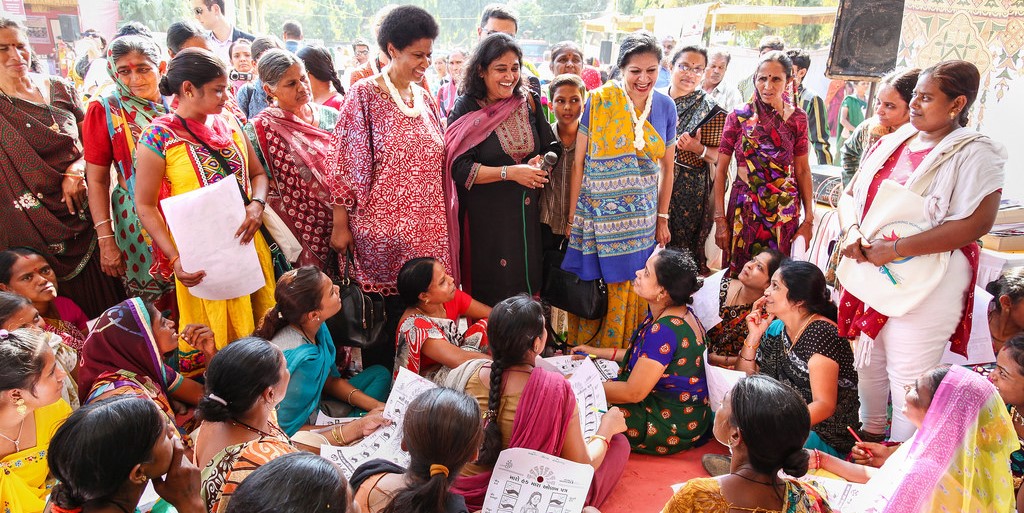By Melissa Leach
Development Studies dilemmas
In our current times, Development Studies is needed more than ever. As global challenges – from inequality, conflict and migration, to climate change and pandemics – intensify, the established hallmarks of Development Studies have much to offer and need to be nurtured and spread. These include interdisciplinarity, problem-focus, the addressing of connections between global and national processes and the realities of people’s lives and livelihoods, critical examination of institutions and power relations (including those of the aid industry), and the seeking of progressive change. Yet in our current political times, Development Studies is also facing new demands and dilemmas. Researchers are under new pressures to deliver ‘impact’ and ‘evidence-based policy’ as a way to demonstrate their value, at the same time as populist politicians and policy-makers are quick to dismiss experts as irrelevant. We face dilemmas about whether Development Studies should be instrumental and applied, or scholarly and critical, or both at the same time. And despite the turn to ‘universal’ approaches as embodied in the Sustainable Development Goals, there are new calls to decolonise development and Development Studies, linked with wider movements across academia and practice.
These critiques are important, but should certainly not be taken – as some do – as a signal to abandon the whole Development Studies enterprise as irrevocably flawed. Instead, we take the view that ‘Building Development Studies for the New Millennium’ is vitally important and requires these and other dilemmas to be addressed. The chapter by Katy Oswald, John Gaventa and myself offers o the concept of ‘engaged excellence’, and systematic learning about it, as valuable ways forward.
Engaged excellence – and its roots
The term engaged excellence was coined by the Institute of Development Studies (IDS) in 2015 to describe the Institute’s distinctive approach to research and knowledge, teaching and learning, and communications and impact, in development. Engaged excellence means that the high quality and impact of our work depend on us engaging and working with governments and parliaments, international NGOs and local civil society, communities and citizens to achieve positive transformative change, strategically informed by research and knowledge. Perhaps the term ‘excellence’ seems arrogant, but it is also a play on the Research Excellence Framework that governs research in the UK at least, reminding us that we need excellence in engagement too. Perhaps engaged excellence is a new development buzzword – but as Oswald puts it, it also describes opportunities for research that is truly transformative. In sum, it involves integrating four pillars: rigorous, robust evidence; the co-construction of knowledge with actors in society; mobilising evidence for action, and building and working through enduring partnerships. Each, we argue, supports the others.
The emphases and elements of engaged excellence are not new; they have deep intellectual roots in fields including participatory action research, community-university partnerships, the sociology of scientific knowledge and feminist critiques of science, amongst others. Equally, there is much overlap with concepts such as transdisciplinarity and co-production, now advanced in sustainability science, health research and more. But we suggest that Development Studies’ particular concerns with people, power and marginality bring added value to these older and wider debates. In turn, bringing insights from these earlier fields and debates together in the idea of engaged excellence offers new opportunities for Development Studies.
Engaged excellence in practice
Our chapter in the EADI volume ‘Building Development Studies for the New Millennium’ and the IDS Bulletin on which it draws, illustrates and reflects on engaged excellence in action. It considers examples around issues and settings from refugee experiences in Uganda and gender relations in Nairobi, to environmental and land management in Finland and Canada, and food and agriculture in Argentina. Across these and other cases, we explore how engaged excellence can help respond to current epistemological demands (for instance, by exploring ‘truths’ as socially-constructed and plural); pragmatic demands (for instance, ensuring relevance by integrating people’s practical concerns), and normative demands (for instance, through a moral stance that validates diverse perspectives). In relation to these demands, applying the different pillars can help researchers navigate key dilemmas around impact and expertise; scholarship and practice, and decolonisation. Above all, embracing an engaged excellence approach reminds us, constantly, that development and Development Studies are always about power, and the politics of knowledge: forging progressive change requires cognitive justice for those who are at the heart of the positive change we, and they, wish to see.
These reflections also reveal that no one size fits all. Engaged excellence is not a neat framework that will provide easy solutions to complex, context-specific challenges; something that becomes apparent when the four pillars are applied in practice. Equally, there are practical and institutional struggles in taking it forward, ranging from the lack of incentives and training for researchers to work in this way, to the resistances that emerge when established knowledge and power hierarchies are disrupted. In these senses, engaged excellence is less a finished approach than a work-in-progress. But this in turn opens up opportunities for learning and discussion. We hope that our chapter might serve to stimulate these further, as scholars and practitioners continue to work together to forge an enriched Development Studies fit for purpose in the turbulent times of the 21st century.
Register for the related webinar with Melissa Leach and John Gaventa here
Melissa Leach is the Director of the Institute of Development Studies (IDS) at the University of Sussex. Her background is in social anthropology and geography, with an interdisciplinary, policy-engaged research focus in Africa and beyond linking environment, health, technology and gender, with particular interests in knowledge, power and the politics of science and policy processes. She is a Fellow of the British Academy and was awarded a CBE in 2017 for services to social science.
Image by UN Women

